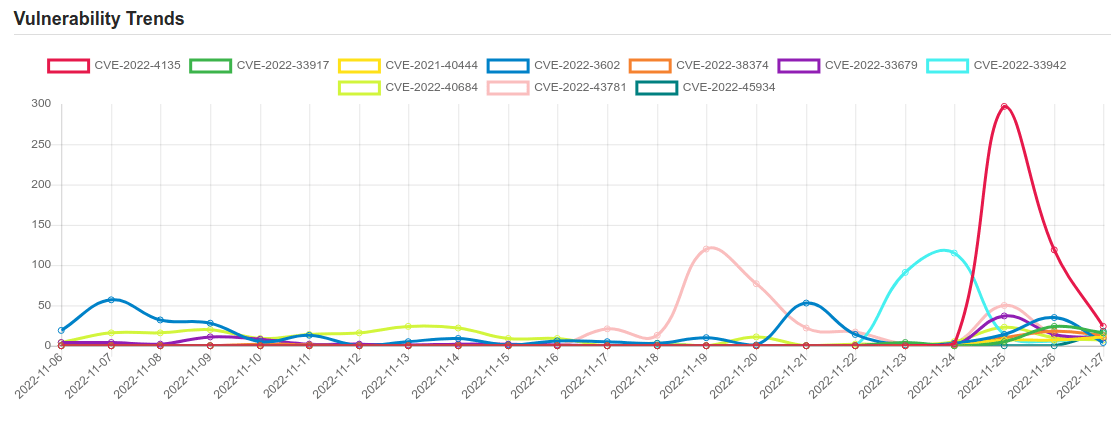Daily Vulnerability Trends: Mon Nov 28 2022

| CVE NAME | CVE Description |
| CVE-2022-45919 | An issue was discovered in the Linux kernel through 6.0.10. In drivers/media/dvb-core/dvb_ca_en50221.c, a use-after-free can occur is there is a disconnect after an open, because of the lack of a wait_event. |
| CVE-2022-32898 | The issue was addressed with improved memory handling. This issue is fixed in iOS 15.7 and iPadOS 15.7, iOS 16, macOS Ventura 13, watchOS 9. An app may be able to execute arbitrary code with kernel privileges. |
| CVE-2022-40127 | A vulnerability in Example Dags of Apache Airflow allows an attacker with UI access who can trigger DAGs, to execute arbitrary commands via manually provided run_id parameter. This issue affects Apache Airflow Apache Airflow versions prior to 2.4.0. |
| CVE-2021-21551 | Dell dbutil_2_3.sys driver contains an insufficient access control vulnerability which may lead to escalation of privileges, denial of service, or information disclosure. Local authenticated user access is required. |
| CVE-2022-39396 | Parse Server is an open source backend that can be deployed to any infrastructure that can run Node.js. Versions prior to 4.10.18, and prior to 5.3.1 on the 5.X branch, are vulnerable to Remote Code Execution via prototype pollution. An attacker can use this prototype pollution sink to trigger a remote code execution through the MongoDB BSON parser. This issue is patched in version 5.3.1 and in 4.10.18. There are no known workarounds. |
| CVE-2022-30190 | Microsoft Windows Support Diagnostic Tool (MSDT) Remote Code Execution Vulnerability. |
| CVE-2021-20038 | A Stack-based buffer overflow vulnerability in SMA100 Apache httpd server’s mod_cgi module environment variables allows a remote unauthenticated attacker to potentially execute code as a ‘nobody’ user in the appliance. This vulnerability affected SMA 200, 210, 400, 410 and 500v appliances firmware 10.2.0.8-37sv, 10.2.1.1-19sv, 10.2.1.2-24sv and earlier versions. |
| CVE-2022-45930 | A SQL injection issue was discovered in AAA in OpenDaylight (ODL) before 0.16.5. The aaa-idm-store-h2/src/main/java/org/opendaylight/aaa/datastore/h2/DomainStore.java deleteDomain function is affected for the /auth/v1/domains/ API interface. |
| CVE-2022-43705 | In Botan before 2.19.3, it is possible to forge OCSP responses due to a certificate verification error. This issue was introduced in Botan 1.11.34 (November 2016). |
| CVE-2022-45932 | A SQL injection issue was discovered in AAA in OpenDaylight (ODL) before 0.16.5. The aaa-idm-store-h2/src/main/java/org/opendaylight/aaa/datastore/h2/RoleStore.java deleteRole function is affected when the API interface /auth/v1/roles/ is used. |
| CVE-2022-4135 | Heap buffer overflow in GPU in Google Chrome prior to 107.0.5304.121 allowed a remote attacker who had compromised the renderer process to potentially perform a sandbox escape via a crafted HTML page. (Chromium security severity: High) |
| CVE-2022-33917 | An issue was discovered in the Arm Mali GPU Kernel Driver (Valhall r29p0 through r38p0). A non-privileged user can make improper GPU processing operations to gain access to already freed memory. |
| CVE-2021-40444 | Microsoft MSHTML Remote Code Execution Vulnerability |
| CVE-2022-3602 | A buffer overrun can be triggered in X.509 certificate verification, specifically in name constraint checking. Note that this occurs after certificate chain signature verification and requires either a CA to have signed the malicious certificate or for the application to continue certificate verification despite failure to construct a path to a trusted issuer. An attacker can craft a malicious email address to overflow four attacker-controlled bytes on the stack. This buffer overflow could result in a crash (causing a denial of service) or potentially remote code execution. Many platforms implement stack overflow protections which would mitigate against the risk of remote code execution. The risk may be further mitigated based on stack layout for any given platform/compiler. Pre-announcements of CVE-2022-3602 described this issue as CRITICAL. Further analysis based on some of the mitigating factors described above have led this to be downgraded to HIGH. Users are still encouraged to upgrade to a new version as soon as possible. In a TLS client, this can be triggered by connecting to a malicious server. In a TLS server, this can be triggered if the server requests client authentication and a malicious client connects. Fixed in OpenSSL 3.0.7 (Affected 3.0.0,3.0.1,3.0.2,3.0.3,3.0.4,3.0.5,3.0.6). |
| CVE-2022-38374 | A improper neutralization of input during web page generation (‘cross-site scripting’) in Fortinet FortiADC 7.0.0 – 7.0.2 and 6.2.0 – 6.2.4 allows an attacker to execute unauthorized code or commands via the URL and User fields observed in the traffic and event logviews. |
| CVE-2022-33679 | Windows Kerberos Elevation of Privilege Vulnerability. This CVE ID is unique from CVE-2022-33647. |
| CVE-2022-33942 | Protection mechanism failure in the Intel(R) DCM software before version 5.0 may allow an unauthenticated user to potentially enable escalation of privilege via adjacent access. |
| CVE-2022-40684 | An authentication bypass using an alternate path or channel [CWE-288] in Fortinet FortiOS version 7.2.0 through 7.2.1 and 7.0.0 through 7.0.6, FortiProxy version 7.2.0 and version 7.0.0 through 7.0.6 and FortiSwitchManager version 7.2.0 and 7.0.0 allows an unauthenticated atttacker to perform operations on the administrative interface via specially crafted HTTP or HTTPS requests. |
| CVE-2022-43781 | There is a command injection vulnerability using environment variables in Bitbucket Server and Data Center. An attacker with permission to control their username can exploit this issue to execute arbitrary code on the system. This vulnerability can be unauthenticated if the Bitbucket Server and Data Center instance has enabled “Allow public signup”. |
| CVE-2022-45934 | An issue was discovered in the Linux kernel through 6.0.10. l2cap_config_req in net/bluetooth/l2cap_core.c has an integer wraparound via L2CAP_CONF_REQ packets. |
A considerable amount of time and effort goes into maintaining this website, creating backend automation and creating new features and content for you to make actionable intelligence decisions. Everyone that supports the site helps enable new functionality.
If you like the site, please support us on Patreon using the button below

To keep up to date follow us on the below channels.




